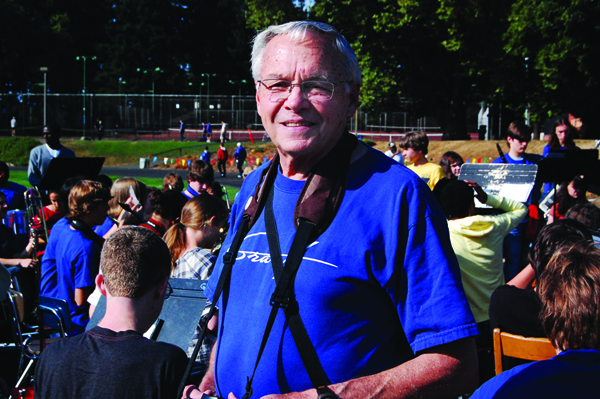Ashley Watkins looks out the window as her plane makes its rocky approach into Honduras. Someone beside her tells her their destination has the second most unsafe airport in the world.
She walks into the terminal and is immersed in the Spanish-speaking culture. That’s when it hits her that she is far from her comfort zone.
Watkins, now a senior at Grant High School, spent six weeks this past summer volunteering for Amigos, a service program for high school and college students who want to travel abroad. Youth from all over the world are brought together to help improve the quality of life for small communities in Latin America.
“Amigos is a wonderful program. It helps the students improve their language abilities and proficiency,” says Ahmed Kelso, a Spanish teacher at Grant who has had seven students participate. “It’s an experience that makes the student value even more what they have.”
For Watkins, her stay in Honduras was a different experience than she expected as she came across hardships she never could have imagined. No hot water for showers, a tarp for a ceiling and sharing a twin bed were some of the things she faced.
“This is how you measure if someone’s rich in Honduras: You walk into their house. Do they have a couch? If they have a couch, they’re rich. I did not have a couch,” Watkins recalls.
Before her trip, Watkins had lived a life that provided her with everything she needed. But only when she broadened her horizons and visited a country lacking even the simplest things was she provided with an important lesson: material things are insignificant compared to what will always be there, most importantly family.
“It made an impact on her,” says Kim Enyart, Watkins’ mother. “She came back even more aware of her surroundings.”
Watkins had sat through the Amigos presentation before but hadn’t considered going. But what really got to her were the pictures of the children in poverty. She realized that she needed to see the world in a bigger picture—in reality. “I wanted to try something that’s so beyond me, beyond this bubble I’m living in,” she remembers thinking. Having taken four years of Spanish, she thought she would be prepared to speak the language but her experience proved her wrong. The town thought Watkins was a mute for the first two weeks she was there.
“I was just so terrified that everyone would laugh at me, which they did. But you just have to get over it,” she says now.
Watkins was connected with two other American students, who after six weeks became like her siblings. “I feel like I could get along with these people for the rest of my life because we’re all there to share a common goal,” she says.
They taught elementary school students about physical health. Most of the children had never been to a doctor before. Getting to the nearest clinic takes a 45-minute walk to catch a bus, then another two hours of driving.
She was in awe of her students who were proactive and self-sufficient. “They need wood for the stove, they go get their machetes and get their wood,” Watkins recalls. “My guy partner didn’t even know how to chop wood as good as the seven-year-old did.”
About one week into her trip, Watkins started a lasting ritual. Each night she would go into the room of her host sister, Kenia. The two would sit and talk. They broke down the language barrier between them, breaking down words so each could understand. With time, it became easy.
Ask her about the relationship and Watkins’ eyes well up as she describes one night in particular with her younger sister. Kenia was sick and the two of them lay in bed and talked all night. Kenia was particularly fascinated with some string that Watkins had brought with her. They made friendship bracelets together as Kenia asked about life in America.
“She was the sweetest person I’d ever met,” Watkins remembers. “I would give anything to see her again.”
She talks about how supportive Kenia was when Watkins got a bad case of parasites. About the second week, she woke up achy and was throwing up. Unbeknownst to her, “we’d eaten oranges that had maggots in them,” she recalls. “I don’t know that that got me sick but I was really worried that was it.”
It’s ironic how some of the worst things in life have some of the most unexpected outcomes. On bed rest for days, she grew incredibly lonely without her usual support group, most significantly her mom.
They didn’t have the best of relationships. Watkins, though, realized how much her mom truly does for her and began to appreciate her more.
“Before Ashley left, she was respectful and appreciated what she had,” Enyart says. “But when she got back, she had gained a whole different level of respect.”
It was those unanticipated experiences that ended up being the most profound for Watkins. She went on her trip expecting everything to be a certain way.
“That’s where I got caught up, expecting everything was going to be perfect and it just wasn’t that way,” Watkins says. “But there’s something you have to understand. Everything always plays out the way it’s supposed to in those situations.”
Watkins experienced an abrupt culture shock after coming back to Oregon. She had trouble relating to the petty things her friends talked about.
“I can’t sit here and listen to you guys talk about this stuff when I was in a foreign country where they were worried about getting the next meal,” Watkins says. “They wear the same clothes every day, they don’t give a crap about all this stuff we’re worried about.”
When Watkins left for Honduras, she had no idea what she’d be up against. Coming back to Portland, she knows she can tackle anything because she was faced with unexpected hardships and turned them into positive life experiences.
“I’ve been thinking about Honduras every day,” she says. “I’m in my world, but it will be with me forever.”




























